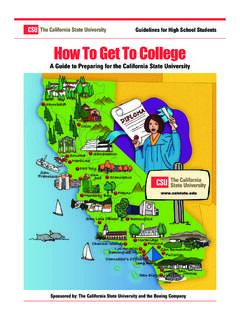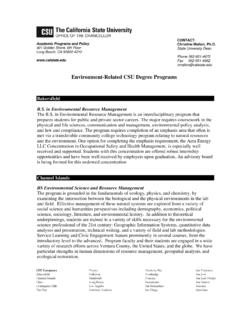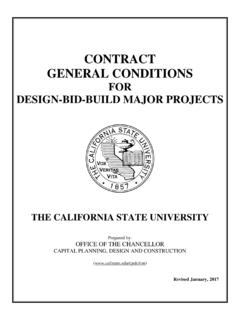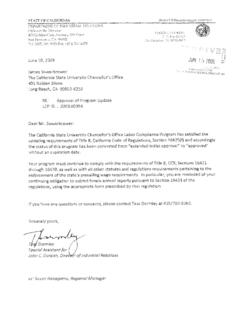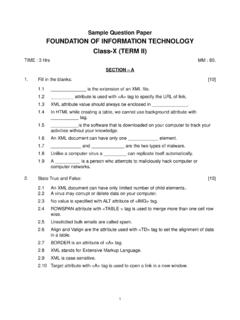Transcription of Information Technology Series Introduction
1 STANDARDSThe California State University SystemClassification andQualificationInformation Technology SeriesIntroductionInformation Technology Series u Introduction u 1 The Information Technology Classification Series is a set of six classification:Class TitleClass CodeDate EstablishedDate RevisedAnalyst/Programmer0400-04024-1-96 N/AOperating Systems Analyst0410-04124-1-96N/AInformation Technology Consultant0420-04224-1-96N/ANetwork Analyst0430-04324-1-96N/AEquipment/Syste ms Specialist0440-04424-1-96N/AOperations Specialist0450-04524-1-96N/AThe Information Technology classification Series includes positions in the computing infrastructure, data andvoice communications, media, including instructional development and broadcasting, and academic anddepartment-based Technology .
2 Each classification includes the multiple Information Technology disciplines ofdata, voice, and video classified within the Information Technology Series are directly responsible for developing, providing,integrating, and/or supporting Information Technology -based solutions and systems. The Series is intended forpositions whose primary functional purpose and requisite skill sets are Information Technology -based. Indetermining whether a position is appropriate for an Information Technology classification, the following questionsare important to consider: What is the primary functional purpose of the position? Is it to develop, provide, or support Technology -basedsolutions or systems or does it use these systems as tools to achieve results? What are the critical skill sets to perform the position s responsibilities?
3 Are the primary skill sets informationtechnology-based? What is the relative importance of subject matter expertise in other functional areas?The Information Technology Series is structured to meet continuing changes in Technology and organizationalstructure. Work within each classification is organized into core functions with typical activities and core , a position may have cross functions and project/lead functions assigned to meet specific campusneeds. The skill level definitions in this Introduction apply to all of the classifications within the informationtechnology Series . The key components of the Information Technology classification Series are defined below:CORE FUNCTIONEach of the six classifications in the Series has identified core functions.
4 A core function is a major category ofwork within a broadly defined classification. Each core function includes descriptions of typical work activitiesand core technical skills without regard to value or skill level. A position in an Information Technology classificationhas the majority of its ongoing work assignments in one or more of the core functions defined for that classification;however, work assignments from a related classification in the Information Technology Series may also be examples and core technical skills cited in the classification standard are illustrative to assist in theclassification process and are not intended to be Technology Series u Introduction u 2 The six classifications in the Information Technology Series and their core functions are summarized as :Analyzes and develops systems and Technology -based solutions to meet user needs including applications,databases, and related systems.
5 The core functions for Analyst/Programmer are: Systems analysis and development Applications programming Database analysisOperating Systems Analyst:Responsible for operating systems and their interfaces to all other multi-disciplinary systems. The core functionsfor Operating Systems Analyst are: Operating systems analysis Operating systems administrationInformation Technology Consultant:Provides consultative support to students, staff, and faculty to enhance the use and access of Technology andinformation systems. The core functions for the Information Technology Consultant are: User consultation Site administration DevelopmentNetwork Analyst:Provides engineering, analysis, and support of all networks carrying voice, data, video, or broadcasttransmissions.
6 The core functions for the Network Analyst are: Network planning and implementation Network analysis and management Network administration and supportEquipment/Systems Specialist:Responsible for installation, modification, and maintenance of equipment and systems with a hardware andsystems configuration focus. The core functions for the Equipment/Systems Specialist are: Equipment services Systems integrationOperations Specialist:Responsible for the effective operation, monitoring, and control of multisystem Information systems in data,voice, or video processing. The core functions for the Operations Specialist are: Technical operations Operations support Operations analysisCROSS FUNCTIONC ross functions are work assignments outside of the classification where the majority of work is are core functions from another classification within the Information Technology Series that may be used topromote skill development or meet unique department COORDINATION/LEAD FUNCTIONSP roject coordination/lead functions include responsibilities for technical coordination of projects and/or providingwork direction to others.
7 These responsibilities are in addition to those included in the core skills and corefunctions of the individual classification. Assignment of these functions will be based on the following Technology Series u Introduction u 3 Technical Project Coordination:The project assignment must include the full scope of responsibility and accountability for a technicalproject including feasibility studies; project design and planning; ongoing resource, materials, and timemanagement; and implementation. The project must have a tangible, measurable outcome, a duration ofsix months or more, and a scope that is moderately complex to complex involving interdepartmental andmultidisciplinary :Lead work assignments must include direction to ongoing regular administrative, technical, or professionalstaff (this excludes student assistants).
8 Lead work direction must include the full scope of responsibilities:evaluating and setting work priorities; scheduling and assigning work; reviewing work against standardsand providing performance feedback; and determining training needs and training LEVEL DEFINITIONST hree broad skill levels are defined for the Information Technology Series : Foundation, Career, and factors used to determine different skill levels include technical know-how, critical thinking skills, andinteraction position is placed at a skill level based on the skill requirements of the position. An individual may be workingat different skill levels in various work assignments or skill dimensions; however, the overall skill leveldetermination is based on where the majority of the skill requirements fall in the skill level following skill level definitions apply to all six classifications within the Series .
9 It is important to note thesedefinitions do not delineate entry requirements at each level, but are composites of the typical incumbent ateach level. Entry qualifications are identified within each standard for initial entry into each classification at thefoundation :Incumbents at this level meet the entry qualifications as defined by the individual classification. Theincumbent may be inexperienced or have limited experience in the specific technical field, but usuallypossesses the general education, training, license or certification pertinent to the body of knowledgeencompassed by the technical specialty. Typically, the incumbent works under direct supervision and isable to demonstrate a basic understanding of the standard principles and terminology associated with thetechnical specialty, address common problems of limited scope, and demonstrate work-readycommunication :The career level is broad and includes intermediate through senior level positions.
10 Incumbents at thislevel work relatively independently and possess the experience to be fully proficient in performing most orall of the work assignments defined for their position. Typically, incumbents have acquired the requisiteskills and knowledge through a combination of education, training, and progressive work experience to beable to demonstrate competence in independently applying technical judgment to standard and nonstandardapplications and systems, solving a wide range of problems and developing practicable and thoroughsolutions, and using effective communication and listening :Incumbents at the expert level work almost completely independently on the most complex problems andwork assignments. They possess an advanced and comprehensive knowledge of the technical specialtyand a working knowledge of related specialties and are able to apply this extensive expertise as a generalistor specialist.




